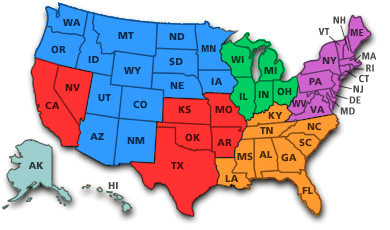| Motorhome rentals, RV rent and Campervan hire in all the States of America (USA) |
 Motorhome DrivingIf you're an experienced car driver, you already have the skills necessary to drive an RV. Motorhomes don’t require a commercial driver’s license for personal use. The automatic transmission, power brakes and steering you're accustomed to are standard features on most RVs.To start sit in the driver's seat before leaving and adjust all mirrors for optimal road views. Account for your vehicle size when turning. The front and rear wheels will track paths much farther apart than those of a car. Allow more time to brake, change lanes and merge onto a busy highway because big vehicles take more time to accelerate and slow down than small ones. RV Safety TipsOn funroads I found a very usefull article about driving savely in a motorhome or rv:Forty thousand people in the United States die each year on the road! With the peak RV travel season quickly approaching I thought this would be a good time to discuss getting to your RV travel destination safely. Getting there can be half the fun, as the saying goes, if you take a few precautions to make your trip safe. The first step is to plan the trip you are taking. Travel guides, magazines, state tourism boards and Internet sites offer valuable information to help you plan your trip. Route your trip on a map or from an Internet trip planning site. Always keep an atlas or maps in the RV or tow vehicle. Driving a motor home or pulling a trailer can be stressful, especially if you don’t know the route you will be traveling. Using a GPS system can make traveling much less stressful. Complete a “Pre-Trip Checklist” before you head out on the road. Simple checks like checking your tires, lights, hitch work and other items all contribute to a safer trip. You should make these checks everyday before traveling. Our “Checklist for RVers” e-book includes a “Pre-Trip Checklist” along with 30 other convenient checklists for RVers. Take plenty of breaks when you’re traveling. Stopping, stretching out and taking brief walks can revitalize you. Do not rush to get to your vacation destination. Driving too fast and for long periods of time can result in fatigue and falling asleep at the wheel. If you feel tired you should pull over and rest or change drivers. It’s a good idea to switch drivers every few hours. Keep a window cracked open to help you stay alert, and only eat light meals when you stop to eat. Avoid driving or pulling your RV during bad weather and high winds. Because of the size and mass of RV’s it can be extremely dangerous to travel during periods of high winds. It’s better to get to your destination one day later, than to risk traveling in bad weather. Limit your driving time to 5 or 6 hours a day (300 to 350 miles). Not only will you be more alert, but you will arrive at the campground with plenty of day light to get set up and settled in before it gets dark outside. This gives you a chance to unwind and get rested for another day of travel, and to enjoy some of the amenities the campground has to offer. Drive defensively! Stay alert and monitor what is going on around you at all times. Use your mirrors. For increased visibility, purchase some convex mirrors that you can stick on your side view mirrors. These mirrors are inexpensive and are available in auto parts stores. They come in different sizes and will improve your visibility a great deal, especially along the sides of the motorhome and in blind spots. If you’re pulling a trailer it may be necessary to add mirror extensions so you can see along the sides of the trailer. Eventually you will have to pass another vehicle in your RV. It's not difficult to pass but with a large RV it requires more space and time than the average automobile. Make sure you have plenty of room and use your turn signals to change lanes. Accelerate until you are past the other vehicle and you can see both of their headlights in your mirror. Signal again to return to the other lane and pull back in. Maintain your speed ahead of the vehicle you just passed. Always leave plenty of room between you and the vehicle in front of you. RV's are much heavier than your automobile and require a longer braking distance to come to a stop. This alone will prevent accidents, especially during emergency braking. Driving at a safe speed also lowers your braking distance. Always use a supplemental braking system on the vehicle you are towing too. Cell phones are nice to have for emergencies, but they can distract the driver. Do not use a cell phone if you are driving. If you must make a call, have someone that is not driving do it for you. Never drink and drive! In a recent study these dates, ranked in order, were identified as the 10 deadliest days of the year to drive. Mark these on your calendar and stay put on these dates. One more day at the campground or getting to your destination one day later can’t hurt you, but driving on these dates could do much worse. Most of the dates are close to, or on a major holiday. The reason for the August dates is because August is the busiest traveled month of the year. Plan your trip, travel safe and smart and enjoy your RV experiences. Remember, getting there is half the fun! |

